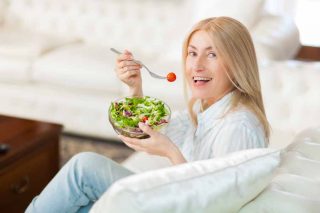Your 50s is the perfect time to make your health even more of a priority, and this might mean making a few tweaks to your lifestyle.
Self-Care Hacks For Your 50s
Forever young!
The 50s are the new 30s, they say, so make the most of this opportunity by upping self-care strategies and giving yourself the best chance of many more decades of good health to come.
Keep moving
Preventing injury by doing longer warm-ups, and more stretching and core exercises when working out is key. walking is a popular workout for those aged 50 and onwards, but combining it with regular strength training exercises or Pilates, at least two to three days a week, is a must at this age to maintain muscle mass and strength, and preserve bone density.
Play it safe
Older women starting a new relationship for the first more time in many years may not think they’re at risk of STIs, but practicing safe sex is important at any age. if you’re starting a new relationship, you and your partner should consider having a full sexual health check-up – this can be as simple as a blood test and a urine test.

Perfect Wave/Shutterstock
Play footsies
dedicating a few minutes every day to your feet will help prevent common problems. Check your feet for any redness, swelling, blisters, dry patches, bumps and sores, moles and freckles, and discoloration underneath the nail.
Seek help from a health professional if you’re concerned. Be sure to keep your feet and leg muscles and joints flexible with regular stretching. Heel pain is common at this age. It is often caused by plantar fasciitis when tissue is damaged or torn by too much pressure. Be sure to see a physiotherapist for special exercises, which help stabilize the ankle and heel.
Bone age
On average, women lose up to 10 percent of their bone mass in the first five years of menopause. the good news is that you can reduce your risk of developing osteoporosis with a few lifestyle changes such as avoiding excessive alcohol intake, not smoking as it has been associated with a higher risk of developing osteoporosis, and avoiding excessive caffeine.
Boost your mind
Learning a new language or taking on other mentally stimulating activities has been shown to strengthen brain cell networks and help preserve mental functions. the cumulative effects of common life factors like chronic illnesses or loss of loved ones can lead to depression and anxiety.
Don’t suffer in silence but rather seek help from a therapist. You can also keep up with relaxation techniques. Yoga has been shown to have a positive effect on anxiety and depression. This is largely due to deep-breathing techniques, which reduce levels of the stress hormone cortisol and slow heart rate.
Work it out
Regular exercise has many proven health benefits. It can help prevent, delay, or manage many of the most common chronic diseases – think heart disease, diabetes, osteoporosis, and obesity – that affect adults 50 and older.
Health check – alert
Early detection
Some cancers can be detected at an early stage. This when treatment is likely to be more effective. Regular self-exams and screenings for various types of cancers – such as cancer of the skin, bowel, cervix, and breast – is important. Ask your doctor about the best cancer screening schedule for you.
How to eat…
Bronwen greenfield says: Menopause is a time of rapid bone loss, so calcium needs to be increased around this age bracket. food sources of calcium include dairy foods like milk, yogurt, and cheese as well as plant-based sources like nuts, seeds, tahini, and leafy green vegetables, our ability to absorb dietary calcium can also be enhanced by achieving adequate vitamin D levels. Hormonal changes also occur with menopause, which can lead to weight gain. at this age, requirements for grains and cereals decrease from six to four serves per day. Also, make sure you’re getting a small amount of protein at each meal and snack.

Minerva Studio/Shutterstoc
Read more
Here are 6 ways for busy people to practice self-care



![women [longevity live]](https://longevitylive.com/wp-content/uploads/2020/01/photo-of-women-walking-down-the-street-1116984-100x100.jpg)










